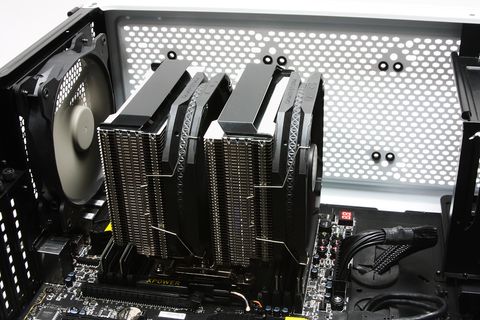Why you can trust Tom's Hardware
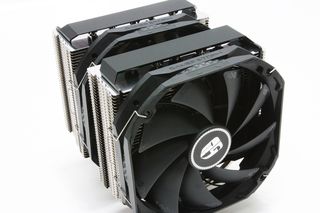
We ran the Deepcool Assassin III on our Intel i7-5930K test system, clocked to 4.2Ghz at 1.20v. As usual, motherboard, memory, chassis and chassis fans all remain the same. We’re using MSI’s X99S XPower AC, 16GB of Crucial Ballistix DDR4-2400 and a Corsair Graphite 760T case. Thermal compound used for testing (as always) is Arctic MX-4.
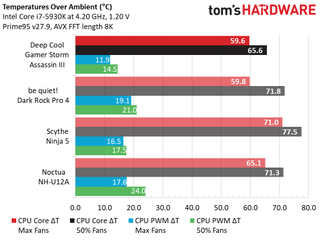
Thermal load over ambient shows us the Assassin III going head to head with the be quiet! Dark Rock Pro 4, an excellent cooler in its own right. The Scythe Ninja 5 is added for comparison, due to its large heatsink size and overall footprint, while the Noctua NH-U12A is slightly smaller but tips the scales on the premium budget side of things as the most expensive cooler in our comparison.
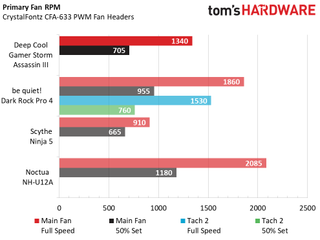
The Deepcool GamerStorm Assassin III is the only cooler of the group to utilize a pair of 140mm fans in its configuration, while the be quiet! Dark Rock Pro 4 utilizes a 135mm and 120mm fan set (hence the need for an additional fan tach readout). Both the Scythe Ninja 5 and Noctua NH-U12A utilize dual 120mm cooling fans. Larger fan diameters of the 135mm and 140mm parts typically result in lower fan RPM and we see that trend play out in our fan speed chart.
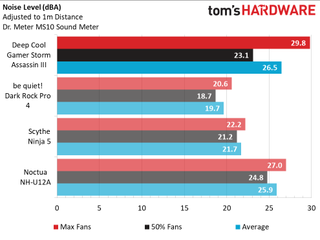
Lower fan speeds typically result in lower decibel readings, however this is more a generalization than a rule. The pair of 140mm fans on the Assassin III manage to register a slightly higher sound readings than others in the group, although with every test falling under 30dBA, we are approaching sound levels low enough you could almost hear us splitting the hairs here.
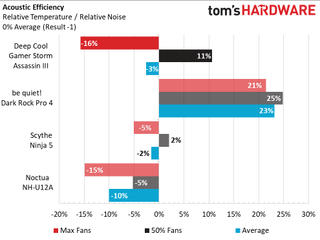
Evaluating thermal performance with a quartet of nearly-silent coolers makes for an interesting acoustic efficiency chart. The excellent performance of both the Deepcool Assassin III and the be quiet! Dark Rock Pro 4 mean that the slightest difference in decibel levels alters the outcome. Although each had great acoustic readings, the Scythe Ninja 5 and Noctua NH-U12A trail a bit further in thermal performance, impacting their graphs.
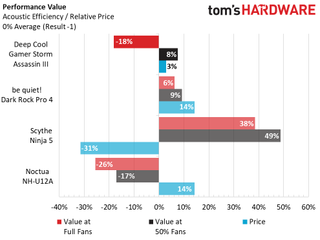
Once we take pricing into account, both the Deepcool Assassin III and the be quiet! Dark Rock Pro 4 become far more normalized on our chart. The Scythe Ninja 5 jumps up into the positive values due to having the lowest price here by a measurable margin, while the Noctua NH-U12A having the highest retail price dips a bit more into negative numbers.
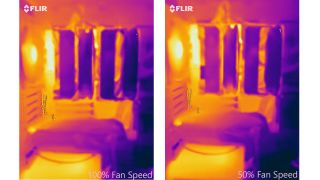
Thermal imaging from our FLIR ONE Pro camera shows some impressive “cold” patterns along the cooling towers on the Assassin III under full CPU utilization, at both 100% and 50% fan speeds. There is some noticeable difference in both photos showing darker (and thus cooler) patterns on the leading tower and minor heat soak progression as airflow moves to the rear of the cooler (right to left).
The Deep Cool GamerStorm Assassin III is an excellent alternative to the usual, more notable names in the large air cooling marketplace. By countering with its own seven-heatpipe, twin-tower heat-dissipating monster, Deepcool has provided the enthusiast community with another great CPU- cooling option that may especially appeal to those wishing to avoid RGB, or lighting of any kind.
MORE: Best CPU Cooling
MORE: How To Choose A CPU Cooler
MORE: All Cooling Content
- 1
- 2
Current page: Comparison Coolers, Testing Results and Conclusion
Prev Page Features and Specifications
Garrett Carver is a contributor for Tom’s Hardware, primarily covering thermal compound comparisons and CPU cooling reviews; both air and liquid, including multiple variations of each.
-
rickmeister The Noctua NH-D15 is The same price (Amazon) as the Assassin III. It has 140mm fans and seems to be a better heads up comparison to the Assassin III. Why wasn't it included in the test?Reply -
msc545 Why in god's name would someone choose a huge, ungainly air cooler over an AIO. The price difference is not that significant.Reply -
Darkbreeze Probably because they don't have any NH-D15 test results on the same test platform that this test was conducted on. Since I believe they've created a newer, more standardized test platform at some point it is likely that there has not been a test of the D15 since doing so. I don't know for sure that that is the reason, but that would be my guess.Reply
Obviously, a comparison of other twin finstack coolers would seem a lot more appropriate but not if the comparison cannot be done using the same test platform. That would just make it pointless. -
Darkbreeze Replymsc545 said:Why in god's name would someone choose a huge, ungainly air cooler over an AIO. The price difference is not that significant.
There are MANY reasons why.
More expensive.
Doesn't particularly cool better unless you go with a very large AIO. 280mm is just about a requirement if you want to beat a twin finstack 140mm cooler.
AIO is louder. In some cases, MUCH louder, especially if you factor in pump noise.
Air coolers don't leak. And if you think AIO leakage is uncommon, you haven't been around them, or here, very often.
AIO coolers last, on average, about three years before pump failures force you to replace the whole cooler. Air coolers, you might have to replace a fan every six to ten years, maybe. If you keep the heatsink cleaned regularly and have intake filtration, you may not need to replace the fan for longer than that. And even if you do, 25 bucks for a good high end fan is a lot easier to swallow than another 100-160 bucks for a replacement AIO unit. In some cases, especially on cheaper AIO units, they pump may not even last that long. We've seen a number of units that barely made it out of warranty, or didn't even make it out of warranty.
An AIO is not like a custom open loop. It is not ever going to give you that kind of water cooled performance. AIO units main appeal is aesthetics, not pure performance. If you like the look, then there is much to be said for them. Otherwise, unless you go with a very good 280, 360 or 420mm cooler, you're not really going to gain anything in terms of performance over a big air cooler. -
msc545 I disagree at least in part. AIO's are in the same price range (75-150) as air coolers, and adjusted properly, they cool much better than air coolers.Reply
There is no way that an AIO pump is noisier than an air coolers fan(s). I've had AIO coolers going continuously for about 4 years now with no leaks or failures, although I admit a leak is something of major concern.
The best things about AIO coolers is 1) they fit in the case; 2) they are quiet); 3) they don't accumulate dust in the same way air coolers do and are easier to clean; 4) they cool better; 5) they don't weigh so much as to distort sockets and motherboards, which some air coolers do; 6) you don't have to remove an AIO to transport a computer in the upright position. -
Virtual_Singularity Reply
Risk of leakage, corrosion, pump probs, etc inherent with AIO water coolers & even costly closed loops, only grow with time. That some water AIOs are beaten by air coolers, or the cost of some AIO's being expensive vs air coolers for negligible results is also weighed (sry for pun) by many consumers when making their choice.msc545 said:Why in god's name would someone choose a huge, ungainly air cooler over an AIO. The price difference is not that significant.
Valid question for sure, but not surprised at all the D-15 wasn't included here. I'd bet the Deepcool is likelyrickmeister said:The Noctua NH-D15 is The same price (Amazon) as the Assassin III. It has 140mm fans and seems to be a better heads up comparison to the Assassin III. Why wasn't it included in the test?
better or similar to the stock D-15, and in another test chart from another site it showed just that, though not by much. I know this prolly won't be too helpful, but fwiw my experience showed the newer, more compact NH-U12A slightly beating/on par with the D-15. Tho depending on processor type, size, load under OC, ambient temps, and many other variables, it's really always a toss up in re to charts, when it comes to temps most of all. -
Darkbreeze Reply
Nobody said the pump alone was noisier. You want to run your AIO with just the pump? I didn't think so.msc545 said:There is no way that an AIO pump is noisier than an air coolers fan(s).
The noise levels for practically any 240-420mm AIO is always going to be louder if you factor in not only the two fans that will be running but the addition of pump noise as well. Even coolers with two fans on the heatsink are typically quieter because unlike an AIO they are buried inside the case rather than being faced directly against an opening to the outside. It's really no different that taking an alarm clock that is ringing and putting it in a box. Sure, you can still hear it, but it's going to be quieter than it was before.
This is obviously not directly comparable but it is in fact representative of what you'll find, across the board, doing similar comparisions. Note that practically every AIO except the Floe Ring 360 is louder than the nine air coolers in the comparison. And the Floe Ring is a 360mm so clearly it can run it's fans a bit slower while still maintaining fairly decent performance since it has a lot more surface area AND an additional fan.
Overall, AIO coolers are much noisier, with 50-60db not being uncommon under load. Sure, you can tune them for quieter operation but you are going to lose a significant amount of performance that way. By comparison, The NH-U14S or NH-D15 can be run at full speed fans and with a decent case the noise levels are low enough to be conversational. Spin it however you like, complain about the full speed 12v operation, the fact remains that most AIO coolers are going to have significantly louder cumulative noise levels with it's two fans and pump than an air cooler is. At least if it is a decent quality cooler with good quality fans.
And I don't ever have to check to see if the damn thing has ruined my hardware today or not. Nor do I have to guess if my thermal issues are due to a bad pump. Nor will it cost me another 120 bucks when something does go wrong with my cooler.
-
PapaCrazy Replymsc545 said:Why in god's name would someone choose a huge, ungainly air cooler over an AIO. The price difference is not that significant.
Everyone's raised good points. I'd just like to point out the risk for single point catastrophic failure is much higher due to increased complexity.
Single point of failure worst case scenario air cooled: One of the two push-pull fans blows a bearing. You chug along with one fan at higher temps. CPU throttles slightly. Maybe you get really unlucky and even the second fan breaks. You still have a large heat sink. It cannot fail. Redundancy in cooling. More throttling, but CPU chugs along. Fans can be replaced same day without removal of entire system.
Single point of failure worst case scenario water cooled: Pump breaks, and water sits still over the CPU block like a thermal blanket. CPU temps continue to increase, despite attempts to throttle. TJ Maxx of 100c is boiling point for water. Fluid near the CPU block cannot distribute its heat, climbing toward 100c and increasing pressure inside the tubes. Pressure causes tubes to rupture, hosing down motherboard and GPU. Things suck for a while. -
rickmeister ReplyVirtual_Singularity said:Valid question for sure, but not surprised at all the D-15 wasn't included here. I'd bet the Deepcool is likely
better or similar to the stock D-15, and in another test chart from another site it showed just that, though not by much. I know this prolly won't be too helpful, but fwiw my experience showed the newer, more compact NH-U12A slightly beating/on par with the D-15. Tho depending on processor type, size, load under OC, ambient temps, and many other variables, it's really always a toss up in re to charts, when it comes to temps most of all.
The U12A may keep up at lower TDPs but my 8700K ran 12C cooler with the D-15 over the U12A and it took longer to saturate the cooler. Recovery time was better on the U12A. -
rubix_1011 The NH-D15 has not been tested on this platform; DarkBreeze is correct. It's an older cooler and I haven't been sent one from Noctua to test. The be quiet! Dark Rock Pro 4 is one of the largest/newer coolers I've covered and have normalized test data for. Since I took over the cooler reviews a few years ago, the platform needed to be re-benched and we needed a new place to start. I apologize for not having that data for comparison, but allow me to explain.Reply
The NH-D15, while being excellent for its age, was likely covered before the period when I had the test bench setup. I don't have access to every cooler available - I only have test data on coolers which have been supplied by vendors to be evaluated and get coverage on the site. I have actually asked Noctua for an NH-D15 sample that I can test and use for reference and while new models are often the priority, sometimes getting older components takes longer to get responses - hopefully I'll get one soon, I really would like to do a larger round-up article on large air coolers vs. AIOs, so it's rather ironic this conversation is taking place here.
To address other points of big air vs AIOs: Honestly, I'd personally rather have a larger air cooler than an AIO at the same price, and I'm a custom watercooling guy of more than 18 years. I do have some newer AIOs that are in my queue to be evaluated that are incredibly good looking, though.
While AIOs have gotten far better in recent times, quality air cooling has also come a VERY long way in the same period while also still remaining immune to the biggest fear most PC tech forums face: 'leaks'.
Most big air coolers are also nearly silent, or at least quieter than closed loop liquid cooling. The same cannot be said for a 240mm AIO...go compare the dbA on my test comparisons.
